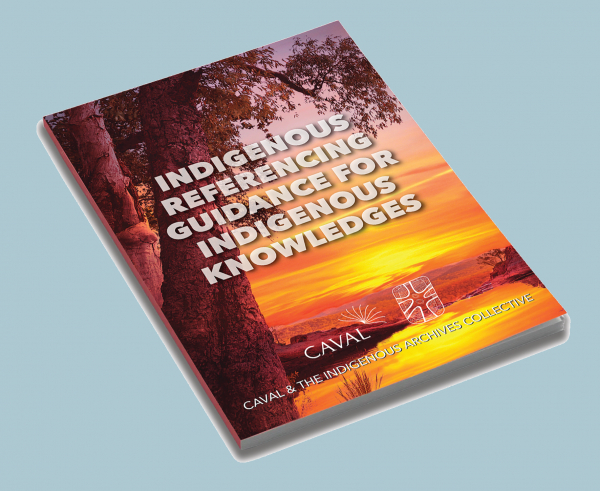CACIK
The CAVAL Acknowledging Cultural Authority and Indigenous Knowledges in referencing working group (CACIK) was formed in early 2020. Since then, the group has worked collaboratively with Indigenous and settler colleagues from the GLAM sector to create a CAVAL member-wide living guiding principles document to be used when referencing Indigenous knowledges within Victoria. Find out about the project below or visit the guide Indigenous Referencing Guidance for Indigenous Knowledges.
Background
Since the end of 2018, academic librarians in Victoria have been discussing and consulting on ways in which library staff work with First Nations people to co-create referencing guidance that is inclusive of Indigenous knowledges and knowledge-sharing practices. In early 2020, the CAVAL Acknowledging Cultural authority and Indigenous Knowledges in referencing working group (CACIK) was formed to gather information about existing citation practices and issues when referencing Indigenous knowledges, with an aim to consider how library staff could further the conversation about communicating and acknowledging Indigenous knowledges.
Throughout 2020 CACIK consulted First Nations and settler academics, the Australian Institute of Aboriginal and Torres Strait Islander Studies (AIATSIS) representatives, and library professionals on the topic. As CACIK was made up of four settler librarians the consultation group recommended that this project should not proceed without Indigenous guidance and leadership. This aspect was recognised as a necessity by CACIK and in order to support this recommendation and apply for CAVAL funding, a comprehensive environmental scan of the landscape of acknowledging Indigenous knowledges in referencing was undertaken by CACIK in 2021.
In late 2021 funding was approved for an Indigenous consultation partner who would support CACIK in their mission to co-create the foundations of a living guiding principles document regarding citation practices, elements to consider, and issues which may arise when referencing Indigenous Knowledges within Victoria.
Following an expression of interest process the Indigenous Archives Collective (IAC) joined CAVAL as a research and consultation partner on the Indigenous Referencing Guidance for Indigenous Knowledges project.
The Indigenous Archives Collective (IAC) research team
Method
"The Indigenous Archives Collective responded to the CAVAL Expression of Interest (EOI) for the CAVAL Consultation Partner – Referencing guidance for Indigenous Knowledges on 2 June 2022. Collective members Dr Shannon Faulkhead, Dr Kirsten Thorpe, Lauren Booker, Rose Barrowcliffe and Nathan Sentance agreed to work as the research team on the project, with feedback from the wider Collective being sought as necessary. The project was administered through the University of Technology Sydney through the Jumbunna Institute for Indigenous Education & Research.
The core group of authors worked online on scoping the project and met with the CAVAL team and the CAVAL Acknowledging Cultural authority and Indigenous Knowledges in referencing Working Group (CACIK) to discuss the project’s background and scope and the aims that CAVAL were seeking to achieve. A draft response to the referencing guidance was compiled following a two-day collaborative meeting of the IAC research team at the University of the Sunshine Coast, with one IAC member meeting online.
A document draft was provided to CAVAL for initial feedback before consulting with key community members and colleagues for input. In particular, feedback was sought from those who participated in the initial discussions on the referencing guidelines with CAVAL in 2020-2021, members of the Museums Victoria Aboriginal Cultural Advisory Group and the Yoowinna Wurnalung Aboriginal Healing Service.” (Indigenous Archives Collective et al. 2023).
Scope and Limitations
The scope of the consultation project was to develop referencing guidance for undergraduate students, and liaison librarians supporting these students, when citing Indigenous knowledges in academic writing in a Victorian context.
As the guidance is specifically created for a Victorian context, with consultation sought from the Indigenous knowledge centres (or equivalent) at CAVAL member institutions, the Museums Victoria Aboriginal Cultural Advisory Group, and the Yoowinna Wurnalung Aboriginal Healing Service, consultation with local Indigenous communities would need to be undertaken prior to implementing these guidelines at your location.
The Indigenous Referencing Guidance for Indigenous Knowledges was created for undergraduate students. In order to support Higher Degree Research (HDR) students and research staff to consider informed consent and building attribution into the entire research cycle, including the ethics process, further work need to be developed.
References
Indigenous Archives Collective; Faulkhead, S; Thorpe, K; Sentance, N; Booker, L; & R Barrowcliffe. (2023) Indigenous Referencing Guidance for Indigenous Knowledges. Indigenous Archives Collective and the UTS Jumbunna Institute of Indigenous Education and Research.
The logo ‘Connecting Community Culture and Knowledge’ is designed by Koorie artist Maree Clarke. This logo can be found next to the CAVAL logo on the front cover of the Indigenous Referencing Guidance for Indigenous knowledge image at the top of this page.






